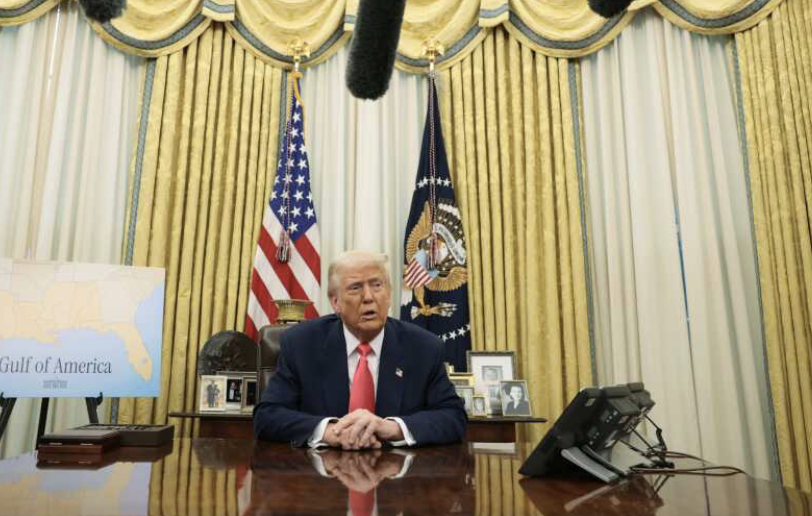Portrait Recently Added to Trump's Oval Office Could Have a Much Deeper Meaning Than It Appears

A recent addition to Donald Trump’s Oval Office decor may hold more significance than it first appears. A portrait of President James K. Polk now hangs in the White House, a nod to a leader whose legacy some see reflected in Trump’s own ambitions.
For those who might need a refresher on American history, Polk was the 11th president, serving from 1845 to 1849, during the height of "Manifest Destiny." His presidency was marked by territorial expansion, as he pursued an aggressive agenda to extend America’s reach.
Trump has similarly expressed expansionist ideas, discussing the possibility of acquiring Greenland, reasserting U.S. control over the Panama Canal, and playing a key role in rebuilding Gaza. He even renamed the Gulf of Mexico as "the Gulf of America." In today’s era, where battles are often fought economically rather than militarily, Trump has taken on global competitors he views as threats to American strength.
Amid these efforts, he seems to have drawn inspiration from Polk, as reported by the Wall Street Journal. In February, Trump replaced a White House portrait of Thomas Jefferson with that of Polk, giving the former president a prominent spot in the Oval Office.
Trump has expressed admiration for Polk’s territorial acquisitions, which included the Oregon Territory, Texas, California, and much of what is now the American Southwest.
"He got a lot of land," Trump reportedly told White House visitors after the portrait was installed.
Polk’s expansion of U.S. land through war with Mexico has been described as "one of the largest land grabs in world history," according to historian Hampton Sides, author of "Blood and Thunder: An Epic of the American West."
"He wanted it all, and he got it all in one term, which was kind of extraordinary if you think about it," Sides noted.
White House press secretary Karoline Leavitt defended Trump’s bold vision for America.
"President Trump is unafraid to propose new, bold ideas in his effort to put America first, and everything he says is true — Greenland is superbly strategically located in the Arctic; the Panama Canal should no longer be run by the Chinese Communist Party; and Canada has been ripping off American farmers and workers for decades. Where’s the lie?" she said.
Historian John Pinheiro, director of research at the Acton Institute, pointed out the similarities between the two presidents.
"Polk had a vision of a bicoastal nation with commerce with Europe on one coast and Asia on the other," Pinheiro said. "If [Trump] and Polk have anything in common … it’s looking next door."
Before Trump even took office, commentator Rich Lowry drew comparisons between the two leaders. Writing in National Review, Lowry noted that Polk "added more than 1 million square miles to U.S. territory and extended the country all the way to the Pacific, making him the most successful president not celebrated as part of the American pantheon."
According to Lowry, both men shared "an American geopolitical voice that seeks dominance in our immediate environs and that is highly sensitive to overseas powers — in this case, China — on our periphery."
While Lowry stated his preference for expansion through negotiation rather than war, he suggested that "maybe his portrait in the Oval would send a message."
In "The Political Underdogs," a 2020 book by Alexandre G. Bojko, the connection between Trump and Polk was further explored. The book’s Amazon description highlighted that both leaders "were workaholics in their early and presidential lives and rarely compromised on any political issue."
"They listened to the pleas of the American ‘common’ man electorate and proved the political establishment wrong when Election Day came. Both men contributed to a national rebirth that made the United States economically stronger. But most importantly, both James K. Polk and Donald J. Trump became strong patriotic leaders despite being political underdogs," the description stated.
Trump himself drew a direct parallel in his inaugural address, declaring:
"The United States will once again consider itself a growing nation — one that increases our wealth, expands our territory, builds our cities, raises our expectations, and carries our flag into new and beautiful horizons. And we will pursue our manifest destiny into the stars, launching American astronauts to plant the Stars and Stripes on the planet Mars."
He continued:
"Our American ancestors turned a small group of colonies on the edge of a vast continent into a mighty republic of the most extraordinary citizens on Earth. No one comes close."